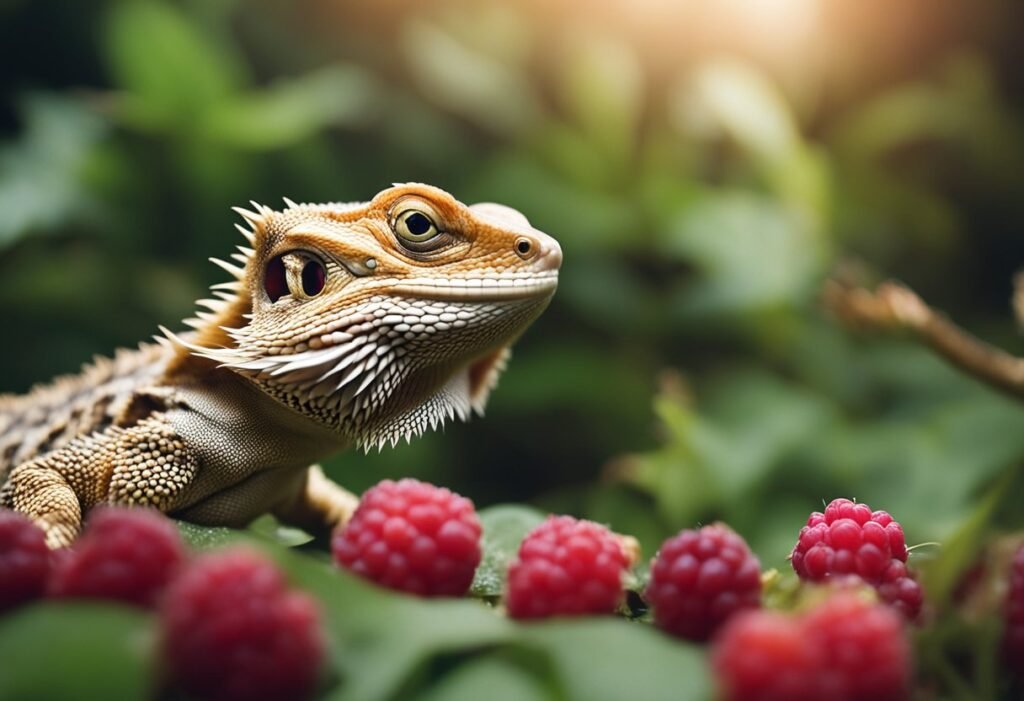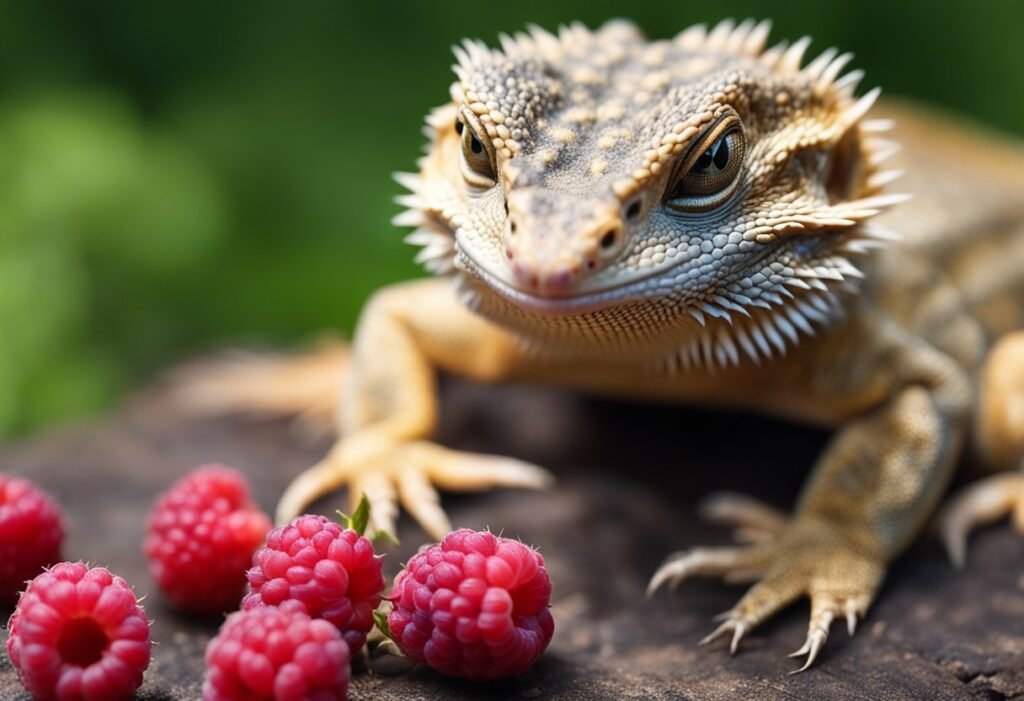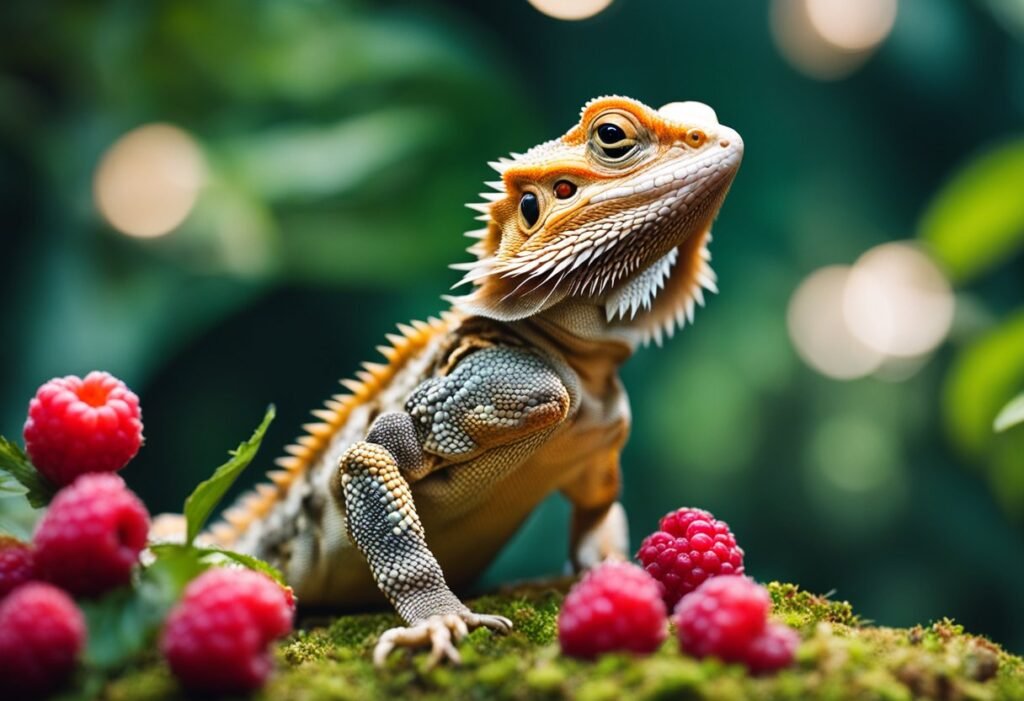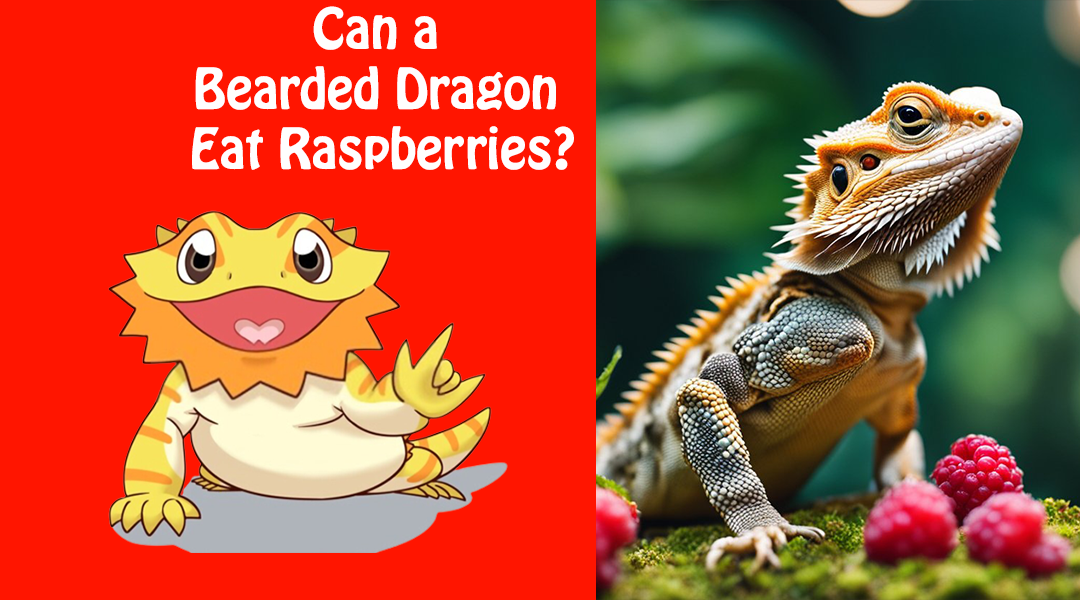Bearded dragons are one of the most popular reptiles kept as pets due to their docile nature and unique appearance. As a responsible pet owner, it’s important to provide them with a balanced diet that meets their nutritional needs. While bearded dragons are primarily insectivorous, they can also benefit from a variety of fruits and vegetables. One fruit that may catch your eye is raspberries, but can bearded dragons eat them?
Raspberries are a sweet and juicy fruit that are high in fiber, vitamin C, and antioxidants. They are a popular snack for humans, but what about bearded dragons? As omnivores, bearded dragons can eat a variety of fruits and vegetables in addition to their insect-based diet. However, it’s important to note that not all fruits and vegetables are safe for them to consume. In this article, we will explore whether or not bearded dragons can eat raspberries and if they provide any nutritional benefits.
Nutritional Benefits of Raspberries for Bearded Dragons

Raspberries are a delicious and nutritious fruit that can be a great addition to a bearded dragon’s diet. They are high in fiber, vitamin C, and antioxidants, which can help support a bearded dragon’s overall health.
Here are some of the key nutritional benefits of raspberries for bearded dragons:
High in Fiber
Raspberries are a good source of fiber, which can help regulate a bearded dragon’s digestive system. Fiber is important for maintaining healthy bowel movements and preventing constipation.
Rich in Vitamin C
Raspberries are also high in vitamin C, which is an important nutrient for bearded dragons. Vitamin C helps support the immune system and can help prevent illnesses and infections.
Antioxidant Properties
Raspberries contain antioxidants, which can help protect a bearded dragon’s cells from damage caused by free radicals. Antioxidants are important for maintaining overall health and preventing diseases.
When feeding raspberries to your bearded dragon, it is important to remember to offer them in moderation. While raspberries are a healthy treat, they should not be a staple food in a bearded dragon’s diet. Be sure to offer a variety of other fruits and vegetables to ensure your bearded dragon is getting all the nutrients they need.
Feeding Raspberries to Bearded Dragons

Raspberries are a delicious fruit that many of us enjoy as a snack or in desserts. But can bearded dragons eat raspberries? In this section, we will discuss the frequency and amount of raspberries that can be fed to bearded dragons, as well as the preparation and serving methods.
Frequency and Amount
Raspberries can be a healthy addition to a bearded dragon’s diet when fed in moderation. We recommend feeding raspberries as an occasional treat rather than a regular part of their diet. Bearded dragons require a balanced diet of vegetables, fruits, and insects to maintain good health, and raspberries should not be the primary source of nutrition.
When feeding raspberries to your bearded dragon, it is important to keep the amount in check. Too many raspberries can cause digestive issues such as diarrhea or constipation. We suggest feeding no more than one or two raspberries at a time, and no more than once or twice a week.
Preparation and Serving Methods
Before feeding raspberries to your bearded dragon, it is important to properly wash them to remove any pesticides or chemicals. We recommend using organic raspberries whenever possible. It is also important to remove any stems or leaves before serving to your bearded dragon.
Raspberries can be served to your bearded dragon either whole or mashed. Some bearded dragons may prefer mashed raspberries, while others may enjoy whole raspberries. Be sure to monitor your bearded dragon while they are eating to ensure they are not choking or having difficulty swallowing.
In conclusion, raspberries can be a healthy and tasty treat for your bearded dragon when fed in moderation. Remember to wash them thoroughly, remove any stems or leaves, and monitor your bearded dragon while they are eating. By following these guidelines, you can safely incorporate raspberries into your bearded dragon’s diet.
Possible Health Risks

When feeding your bearded dragon raspberries, it is important to be aware of the possible health risks. Here are some potential concerns to keep in mind:
Sugar Content and Obesity
Raspberries are relatively high in sugar, which can contribute to obesity and other health problems in bearded dragons. While small amounts of raspberries as an occasional treat are unlikely to cause harm, feeding them in excess can lead to weight gain and other issues.
Pesticides and Toxins
Like all fruits, raspberries may contain traces of pesticides or other toxins. It is important to wash them thoroughly before feeding them to your bearded dragon to minimize the risk of exposure. Choosing organic raspberries can also help reduce the risk of harmful chemicals.
Allergic Reactions
Some bearded dragons may have allergic reactions to raspberries, which can cause symptoms such as itching, swelling, and difficulty breathing. If you notice any signs of an allergic reaction, such as redness around the mouth or labored breathing, stop feeding raspberries immediately and contact your veterinarian.
Overall, while raspberries can be a tasty and nutritious treat for bearded dragons in moderation, it is important to be aware of the potential risks and take steps to minimize them.
Alternative Fruits and Vegetables
When it comes to feeding your bearded dragon, it’s important to provide a variety of fruits and vegetables to ensure they’re getting all the necessary nutrients. While raspberries are safe for bearded dragons to eat in moderation, there are other options to consider as well.
Safe Fruits for Bearded Dragons
In addition to raspberries, there are several other fruits that bearded dragons can enjoy as a treat. These include:
- Apples (without seeds)
- Bananas
- Blueberries
- Grapes (cut in half)
- Mango
- Melon
- Papaya
- Peach
- Pear
- Plum
It’s important to note that fruits should be given in moderation due to their high sugar content. Aim to feed fruits as a treat, rather than a staple in their diet.
Vegetables in Bearded Dragon Diet
Vegetables should make up the bulk of your bearded dragon’s diet. Here are some safe options to consider:
- Bell peppers (red, green, and yellow)
- Bok choy
- Butternut squash
- Carrots
- Collard greens
- Cucumber
- Endive
- Kale
- Mustard greens
- Turnip greens
- Watercress
- Zucchini
Be sure to chop vegetables into small pieces to make them easier for your bearded dragon to eat. It’s also important to provide a variety of vegetables to ensure they’re getting all the necessary nutrients.
Overall, while raspberries are safe for bearded dragons to eat, it’s important to provide a variety of fruits and vegetables to ensure they’re getting all the necessary nutrients in their diet. By incorporating a variety of safe options, you can keep your bearded dragon healthy and happy.
Understanding Bearded Dragons’ Dietary Needs

As responsible pet owners, it is important to understand our bearded dragons’ dietary needs to ensure they stay healthy and happy. Bearded dragons are omnivores, meaning they require a balanced diet of both plant and animal matter. Proper nutrition is essential for their growth, development, and overall well-being.
The ideal diet for bearded dragons consists of leafy greens, vegetables, fruits, and insects. It is important to offer a variety of foods to ensure they receive all the necessary nutrients. Some of the best leafy greens for bearded dragons include collard greens, mustard greens, and dandelion greens. These greens are high in calcium and vitamin A, which are essential for bone health and vision.
When it comes to vegetables, bearded dragons enjoy a variety of options such as carrots, squash, and bell peppers. These vegetables are rich in vitamins and minerals that help support their immune system and overall health. Fruits, such as raspberries, can also be offered in moderation as a treat. However, it is important to note that fruits are high in sugar and should not make up a significant portion of their diet.
In addition to plant matter, bearded dragons require a source of protein. Insects such as crickets, mealworms, and dubia roaches are excellent sources of protein and can be offered daily. It is important to gut-load insects with nutritious foods before feeding them to your bearded dragon to ensure they receive proper nutrition.
In conclusion, understanding the dietary needs of your bearded dragon is crucial for their health and well-being. Providing a balanced diet of leafy greens, vegetables, fruits, and insects will help ensure they receive all the necessary nutrients they need to thrive.
Expert Tips for a Balanced Bearded Dragon Diet
When it comes to feeding your bearded dragon, it’s important to provide a balanced diet that meets their nutritional needs. Here are some expert tips to ensure your bearded dragon is getting the nutrients they need to thrive:
- Offer a variety of insects: Bearded dragons are omnivores, meaning they eat both plants and animals. Insects such as crickets, mealworms, and dubia roaches are great sources of protein for your bearded dragon. Vary the types of insects you offer to ensure a diverse diet.
- Incorporate vegetables and fruits: While insects should make up the majority of your bearded dragon’s diet, it’s important to offer a variety of vegetables and fruits as well. Raspberries, for example, can be a tasty treat for your bearded dragon. Other good options include kale, collard greens, carrots, and squash.
- Avoid feeding too much fruit: While fruits can be a healthy addition to your bearded dragon’s diet, they should be fed in moderation. Fruits are high in sugar and can lead to health problems if fed in excess.
- Consider calcium supplementation: Bearded dragons require calcium for strong bones and overall health. Dusting your bearded dragon’s food with calcium powder can help ensure they are getting enough of this important mineral.
- Monitor your bearded dragon’s weight: It’s important to monitor your bearded dragon’s weight to ensure they are maintaining a healthy body condition. Overfeeding can lead to obesity and other health problems, while underfeeding can lead to malnutrition.
By following these expert tips, you can ensure your bearded dragon is getting a balanced diet that meets their nutritional needs.
Frequently Asked Questions
How often can bearded dragons safely consume raspberries?
Bearded dragons can safely consume raspberries as an occasional treat. We recommend feeding them in moderation, no more than once or twice a week. Too many raspberries can cause digestive issues, such as diarrhea, in bearded dragons.
Are raspberry seeds harmful to bearded dragons?
Raspberry seeds are not harmful to bearded dragons. However, we recommend removing the seeds before feeding raspberries to your pet. The seeds can be a choking hazard for your bearded dragon, especially if they are small or young.
Is it safe for bearded dragons to eat raw raspberries?
Yes, it is safe for bearded dragons to eat raw raspberries. However, it is important to wash the raspberries thoroughly before feeding them to your pet. Pesticides and other chemicals can be harmful to your bearded dragon’s health.
What fruits are considered best for bearded dragons?
Bearded dragons require a balanced diet that includes a variety of fruits and vegetables. Some of the best fruits for bearded dragons include papaya, mango, and strawberries. These fruits are high in vitamins and minerals that are essential for your pet’s health.
Which fruits should be avoided in a bearded dragon’s diet?
Some fruits should be avoided in a bearded dragon’s diet, as they can be harmful to their health. These include citrus fruits, such as oranges and lemons, as well as grapes and dried fruits. These fruits are high in sugar and can cause digestive issues in bearded dragons.
Can bearded dragons have a mix of berries, such as raspberries, blueberries, and blackberries?
Yes, bearded dragons can have a mix of berries, including raspberries, blueberries, and blackberries. However, it is important to feed them in moderation, as too many berries can cause digestive issues. We recommend offering a variety of fruits and vegetables to ensure your bearded dragon receives a balanced diet.

I, Mark Antonelli am highly interested in pet care tips. The experiences I gained through university life in animal sciences were also helpful to identify the best tricks for caring for and feeding varying kinds of pets. I know the majority of people love to own a pet. Yet, there is a guilty of owing a Bearded Dragon due to a lack of information about how much friendly and peaceful they are. I thought of filling this gap with detailed writings about this Pogona genus Bearded Dragon. All my team is also giving me great support to fulfil my mission. Hope you will enjoy the journey with us.

